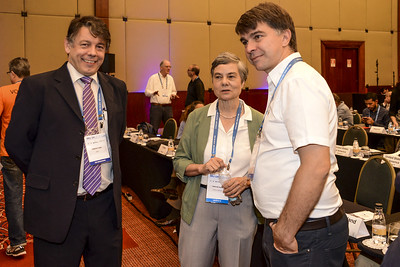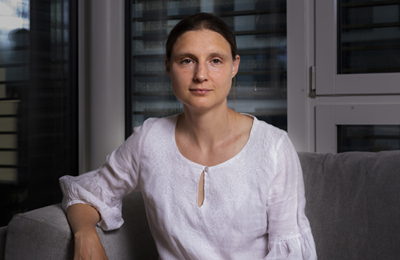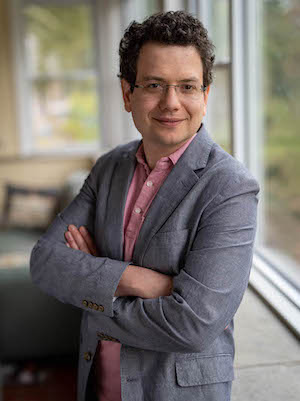The 2022 International Congress of Mathematicians (ICM) was due to take place in July in St Petersburg, Russia. However, with Russia's invasion of Ukraine, the ICM couldn't take place as planned. Despite this challenge the international mathematics community has come together to create an ICM in 2022 like no other.
Every four years, thousands of mathematicians usually gather from around the world for the ICM. "The Congress plays a unique role in mathematics, both by recognising exemplary recent research achievement in all of the various subfields of mathematics, and by giving the broader community of mathematicians the opportunity to learn about the latest mathematical research developments, and to interact with leaders in the field," said the committee of mathematicians overseeing the scientific programme of the 2022 ICM, in their 2019 report.
This exciting highlight of the mathematical calendar is held in a different location around the world each time, featuring invited lectures, panel discussions and events alongside the awarding of some of the most prestigious prizes in mathematics, including the famous Fields Medals. The ICM – particularly planning the scientific programme and selecting the recipients of the prizes – is overseen by the International Mathematical Union (IMU). The IMU is made up of over 80 member countries, each represented by a national organisation such as a learned society or research council. The UK is represented by the London Mathematical Society.
Every four years, alongside the ICM, the IMU holds its General Assembly where over 200 representatives of the member countries come together to discuss and decide on issues important to the wider mathematical community, and to decide on where the next ICM will take place. In 2018 the IMU General Assembly decided that St Petersburg, Russia, would hold the 2022 ICM.
St Petersburg ICM 2022

Marcelo Viana (left) and Stanislav Smirnov (right) at the ICM 2018. Shown here with Caroline Series, then President of the London Mathematical Society. Photo: Davi Campana / R2 /ICM 2018.
After this decision the local organisers of the ICM take over planning the logistics of the in-person event, and the host country's government provides financial assistance to enable the ICM to take place. The 2018 ICM was held in Rio de Janeiro, the first time it had been held in the Southern Hemisphere, and the ICM became a focus for the rapidly developing mathematical community in Brazil, and more widely supporting mathematics in other developing countries. Marcelo Viana, co-organiser of that ICM, spoke to us at last year's IMU centennial and said: "I saw it as an opportunity for advertising maths. From the very beginning we thought of the Congress as an excuse to have people talk about maths, and we framed it as part of a much broader initiative, which we called the Biennial of Mathematics."
At the IMU centennial, Stanislav Smirnov, the co-organiser of the planned 2022 ICM in St Petersburg, said that he hoped holding the ICM in Russia would not only showcase the Russian mathematical tradition, but also to help restart mathematics in Russia.
Preparations for the 2022 ICM initially went as planned, Helge Holden, Secretary General for the IMU, told us when we met him at the beginning of the 2022 ICM: "Our collaboration with our Russian colleagues had been smooth." But then came the global COVID-19 pandemic. "There was a lot of uncertainty, we had to prepare for all sorts of measures." The IMU continued working with the local organising committee in Russia for different eventualities including a fully virtual or hybrid ICM. But by December 2021, as vaccines made their impact and countries began to move out of pandemic measures, the plans had reverted to a fully in-person event in St Petersburg.
Everything changed
Then, on 24 February 2022, Russia invaded Ukraine. "The invasion changed everything overnight," said Holden. The IMU executive committee was in a long-planned virtual meeting that day, and they quickly came to a unanimous decision that the ICM and General Assembly could not go ahead in St Petersburg as planned. As they continued to meet virtually, scattered across 17 timezones over the next four days, the executive committee agreed that an in-person General Assembly and awards ceremony would take place outside of Russia, and the ICM would be held virtually, open to all mathematicians around the world. The committee said after the meeting: "An ICM is a unique meeting place for mathematicians from all over the world to assemble, put political and cultural differences aside, and discuss mathematics."
"We knew we wanted the General Assembly and awards to take place on the scheduled dates and in person. And we would not accept any support from the Russian government, neither money nor staff or anything," said Holden. "And that left us in a very difficult situation. We didn't know where we would hold this, or how we were going to pay for this."
The IMU was soon approached by several member countries offering support, and decided to accept the generous offer to hold these events in Helsinki, Finland. "We were very happy to come to Helsinki in Finland, for many reasons" said Holden. "We have a long tradition with Finland – they held the ICM in 1978 and they had the IMU archives – and it is located between the East and the West. So it was the right place to go."
The General Assembly was held on 3-4 July along more or less along traditional lines with over 200 delegates from member countries of the IMU meeting in person in Helsinki. Among other important business, the General Assembly decided that the next ICM would be held in Philadelphia, USA, in 2026. The delegates also unanimously voted to establish a new reserve fund to temporarily cover the membership costs of member countries that are facing extraordinary hardship, such as that currently faced by Ukraine.
An ICM like no other
Next came an unprecedented event. "Welcome to the IMU awards ceremony – the first to be held in over 100 years of the IMU," said Carlos Koenig on 5 July 2022. Instead of occurring in front of thousands of mathematicians at a full in-person Congress, the IMU awards ceremony took place in front of only 600 mathematicians, with thousands more watching live online from around the world. Koenig celebrated the work of the mathematical community, both for making the event happen in such unusual circumstances, but also thanking them for their involvement in championing the work of mathematicians in the decision process for the IMU awards: "This generosity of spirit is heartwarming and should make us all proud to be a part of this community."
The winners of the Fields Medals were Hugo Duminil-Copin, June Huh, James Maynard and Maryna Viazovska, and Mark Braverman won the Abacus Medal (previously known as the Rolf Nevanlinna Prize). Barry Mazur received the Chern Medal, Elliott Lieb the Gauss Prize and Nikolai Andreev the Leelavati Prize.
Some aspects of the event felt particularly of our time, with appearances of some prize winners and laudators over zoom, with the usual accompanying technical hiccups. But it was a joyous event, despite the difficult and unprecedented circumstances. The laudations and short films about the winners gave a sense of their work, their motivations and their personal stories.

Maryna Viazovska. Photo: Matteo Fieni.
The Fields Medal being awarded to Viazovska felt particularly significant, as she is only the second woman to be awarded this prize, after Maryam Mirzakhani in 2014. And as a Ukrainian mathematician Viazovska's film was particularly moving, describing the impact the war has had on her family and all their lives, alongside her passion and commitment to her mathematics.
The ceremony was followed by a day of lectures from the winners of the Fields and Abacus medals, watched in-person by several hundred excited mathematicians at Aalto University, with thousands more joining virtually from around the world. "Normally the ICM has three or four thousand participants," said Holden. "We had a ceiling of 7,000 participants for our online platform, which 'sold out' quickly. The largest number of participants at any ICM." The virtual ICM had no registration costs, and obviously no travel costs, enabling a much broader distribution of participants to take part than ever before from more countries all over the world.
"This ICM is totally different, we have never done this before," said Holden. Thanks to the work already done by the scientific committee of the ICM, all the speakers and lecture programme were already settled. But Holden and his colleagues at the IMU had to find an online platform to create this virtual ICM before they even had the funding in place. "We had to sign the contracts without having the money, which made me uneasy! But it worked out." The programme followed Central European Summer time, which meant some participants, and some speakers, would be joining in the middle of their night. All speakers had the chance to pre-record their lectures, partly as a backup in case of any last minute technical difficulties.
The virtual ICM has been a huge success with registered participants attending virtually live, and absolutely anyone able to watch the lectures afterwards on the IMU YouTube channel. (To decide what to watch, you can find the details of the programme here.) This open access to the lectures has been such a success that the IMU plans for all lectures at future ICMs to be recorded and made freely available online.
Another important lesson Holden said he had learned from this year's unprecedented ICM was: "We don't want a virtual ICM ever again! And important part of an ICM is to meet, to go for a beer and discuss what is happening in your field and in your university and with your colleagues. That is more important in some sense than the lectures."

Mark Braverman (Photo Lance Murphey)
This social aspect of mathematics came across in the work of so many of the mathematicians, and the importance of their close collaborations was clear in the way many of the prize winners described their mathematical lives. And despite a global pandemic, and a barbaric war, the mathematical community managed to come together to share and celebrate their mathematical research.
Mark Braverman, winner of the Abacus Medal, captured the spirit of the community well in the opening remarks of his lecture: "Putin's action over last years is profound and deep nihilism. Nihilism is like a nilpotent operator – if you try to invert it it will explode. You can't fight it with drones and rockets. The way to fight it is with important activities that celebrate life and the human spirit. And research and mathematics is definitely one of those. This event, [the ICM], had to go on not despite the war, but because of it."
This content was produced as part of our collaborations with the London Mathematical Society and the the Isaac Newton Institute for Mathematical Sciences. You can find all our content on the 2022 International Congress of Mathematicians here.

